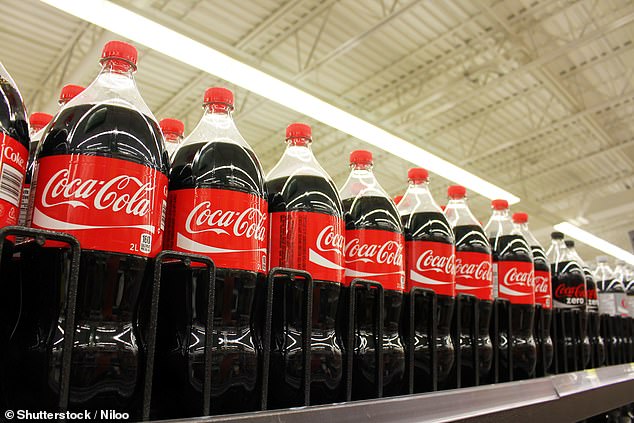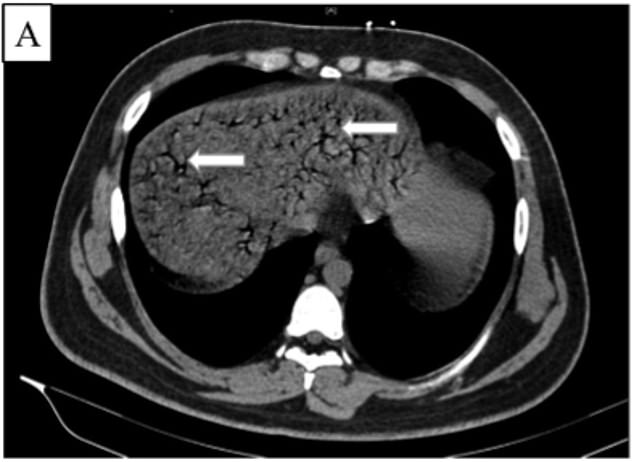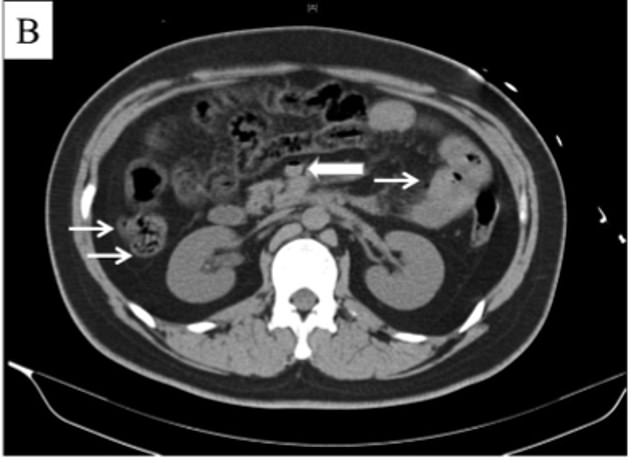A 22-year-old man died after chugging a 1.5litre bottle of Coca Cola in 10 minutes, doctors have revealed.
Medics say the Chinese man’s rapid consumption led to a fatal build-up of gas inside his body, which starved his liver of oxygen and eventually killed him.
The man, who wasn’t identified, went to hospital six hours after consuming the fizzy drink, complaining of severe pain and a swollen stomach.
He told doctors at Beijing’s Chaoyang Hospital he had rapidly downed 1.5L of Coca Cola to help cool off due to the hot weather.
Chugging the beverage so quickly led to gas gathering in his intestines, which due to the pressure then leaked into his portal vein, one of the liver’s main blood vessels.
This caused fatal damage, according to doctors who detailed the case in Clinics and Research in Hepatology and Gastroenterology.
Tests carried out on the man when he was first assessed by doctors showed several worrying signs.
The man, who wasn’t thought to have any underlying health issues, had an elevated heart rate, low blood pressure, and was breathing rapidly.
CT scans found he had pneumatosis, an abnormal presence of gas, in the wall of his intestine and his portal vein.
The scans also revealed he had hepatic ischemia, also called ‘shock liver’, a type of injury caused by low oxygen supply to the organ, which doctors believe was related to the presence of gas in the portal vein.
Lead author of the case report, Qiang He, said medical staff ‘immediately’ set about trying to release the gas from the man’s digestive system.
He was also given medication to help protect his liver and to try to stabilise his other body functions from further damage.
After 12 hours, blood tests showed the man had serious liver damage. His condition deteriorated further and he died 18 hours after treatment.
One British expert today questioned the true cause of the death however, insisting it was unlikely that downing 1.5L of Coca Cola was to blame.
Professor Nathan Davies, a biochemist at University College London, told MailOnline: ‘The chances of downing 1.5 litres, or a little over three pints, of a regular soft drink being fatal would be very, very unlikely, I mean, staggeringly unlikely.’
He said more information was needed than that provided in the report to draw any firm conclusions on killed the man.
And he speculated that a bacterial infection, a known cause of a gas build-up internally, may have been to blame rather than the soft drink.
Professor Davies explained that these bacteria can form gas pockets, causing issues similar to the ones the man experienced before his death.
‘Usually this type of condition is caused because you have bacteria that has made its way from the normal gastrointestinal tract to somewhere they are not supposed to be, in this case, in the lining of the small intestine,’ he said.
The gas produced in the intestines can then leak into other connected areas of the body, like the portal vein.
Professor Davies said that while it was possible consuming a large soft drink may have added to this gas problem, such a combination would be extremely unlikely.
‘It’s possible, but not necessary that likely, that drinking a large amount of carbonated drink could have had an exacerbating affect,’ he said.
‘But with no underlying condition it is very hard to see what could have happened.’
Professor Davies also added that gas in the portal vein would not explain the lack of oxygen the man’s liver was receiving.
He explained that the portal vein carries material from the gut for the liver to process, as opposed to a different blood vessel, the hepatic artery, which carries oxygen to the organ.
‘If you have underlying bacteria there, or another sort of condition, they could be potentially producing their own toxins which would be detrimental to the normal function of the organ,’ he said.
As such, Professor Davies said there is no reason to think consuming fizzy drinks the same way the Chinese man did could have fatal consequences.
Instead Professor Davies said the potential health consequences of regular soft drink consumption were mostly minor and longer term.
‘Obviously it’s not good for your teeth, that’s the key thing, very large quantities of soft drink can have an affect on bone mineralisation,’ he said.
‘A couple of soft drinks a day has no health consequences other than the amount of sugar you are consuming.’
As a final reassurance for fizzy drinks fans, Professor Davies said that considering the amount of carbonated drinks consumed around the world, if they could have fatal consequences there would be far more cases like the Chinese report.
Coca Cola was contacted for comment but had not responded by publication.

The Chinese man told doctors at Beijing’s Chaoyang Hospital that he had consumed 1.5 litres of Coca-Cola in just 10 minutes to help him cool down on a hot day. But the build-up of gas in his intestines eventually leaked into his portal vein, a critical blood vessel connected to the liver, and this led to his death, authors in the Clinics and Research in Hepatology and Gastroenterology reported

CT scans of a 22 year old Chinese man who consumed 1.5 litres of Coke in just 10 minutes show the deadly build up of gas inside his body. The arrows added to the scan indicate where pneumatosis, an abnormal presence of gas in the body, is occurring in the portal vein. The portal vein is a critical blood vessel between the liver and several organs

Gas build up was also present in the 22 year old’s intestinal wall with the thin arrows showing the build-up in three locations in the man’s intestines. The thick arrow points to gas also being present in the superior mesenteric vein, which draws blood from the intestine. The damage caused by build up of gas in the man’s body eventually led to his death
Source link : https://www.dailymail.co.uk/health/article-10012313/Man-died-downing-1-5-litre-bottle-Coca-Cola-10-minutes-doctors-claim.html











